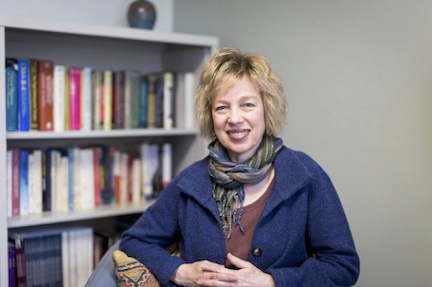“…Emotional and physical health are intimately intertwined, not separate entities. Our emotional health is vitally important to quality of life, and life inevitably presents us all with challenges to emotional well-being.”
– Audrey Bahrick
(ФBK, Ohio Wesleyan University, 1980)
By Nicholas McCarty
Mental health is a growing issue—and an important one—that impacts college campuses particularly harshly. According to a survey by the National Alliance on Mental Illness, 62% of all students who withdraw from college do so because of mental health problems.
Psychologists at colleges and universities across the country, including those at the University of Iowa Counseling Services, are working harder than ever to ensure that students’ needs are met with the resources available to them, and strides are being made in altering the current mental health stigma. But one thing remains persistently clear—mental health needs to be treated with the same focus and care as that of physical health.
During the 2012-2013 academic year, University of Iowa Counseling Services saw 1,788 students for a total of 2,753 consultations, according to the center’s annual report. Staff logged 6,623 hours of individual, couples, and group counseling. Perhaps most notably, University Counseling Services reached over 15,000 participants through 569 different outreach programs.
Audrey Bahrick (ФBK, Ohio Wesleyan University, 1980) is a psychologist with the University of Iowa Counseling Services. I sat down with Bahrick to gather her thoughts on counseling resources, outreach, and destigmatization of mental health.
INTERVIEW
What is your daily role at University of Iowa Counseling Services?
BAHRICK: As a staff psychologist, I have three major areas of responsibility: clinical services, which includes providing assessments and recommendations to clients presenting to the Counseling Service for initial consultations, and providing ongoing individual or group counseling; training and supervision of interns and practicum students in our American Psychological Association-accredited training program; and outreach and consultation services to the university community. Additionally, I coordinate the day to day functioning of our practicum training clinic and teach a beginning practicum class for the Counseling Psychology program. I also enjoy offering services in Spanish when that is requested.
What resources do you feel are currently lacking from University Counseling Services?
BAHRICK: We have been understaffed. Our new director, Barry Schreier, has been very effective in advocating for additional resources for the University Counseling Services and we currently have five staff searches underway. We have also been very actively bolstering our group counseling services. Group counseling is a very effective treatment for many concerns, and is actually a treatment of choice for a number of students that come to us with social anxiety, depression, and difficulties with distress tolerance or eating disorders.

Audrey Bahrick, PhD, staff psychologist at University of Iowa’s Counseling Services, speaks with Nicholas McCarty about the importance of mental health wellness and destigmatization in ensuring the well-being of college students.
Why do you feel that there is there so much media attention surrounding mental health right now?
BAHRICK: The promotion of and maintenance of positive emotional health is a societal challenge, and a real problem that deserves our caring and sustained attention—equal to our concern with physical health. And of course, emotional and physical health are intimately intertwined, not separate entities. Our emotional health is vitally important to quality of life, and life inevitably presents us all with challenges to emotional well-being.
What do you feel needs to be done by University Counseling Services to ensure that every student requiring counseling services receives it in a timely and professional manner?
BAHRICK: We are committed to providing timely, professional services and the university is devoting more resources towards that end—such as funding more positions. When students know about our services and they come, they are helped. Client satisfaction data supports that they are satisfied with our professional services, and that our services contribute to students’ academic achievement and retention, and to promoting an overall healthier climate on campus.
We participate in first year orientation, transfer, and international student orientations. We have a social media presence, reach out to the cultural houses, have active liaisons with many student organizations, and are actively involved in social justice initiatives on campus. Our outreach director, Kathleen Staley (also a member of ФBK), works with an energetic and committed student advisory board to get their perspectives and input about ways to more broadly market our services. Still, students who could benefit from our services may not know about them, or may be reluctant to seek them. Thus, there is always ongoing work to be done on reducing stigma and helping students to feel safe asking for help.
All students are entitled to a consultation and recommendations—philosophically, we provide time limited individual counseling services. Thus, there will always be some students who have ongoing needs for individual support that exceed our resources. One way we are able to serve students for a longer time is via group counseling. We are also considering offering some brief “distress-tolerance” groups geared towards building skills for self-soothing.
Nicholas McCarty is a junior at the University of Iowa majoring in Biochemistry. The University of Iowa is home to the Alpha of Iowa Chapter of Phi Beta Kappa.




